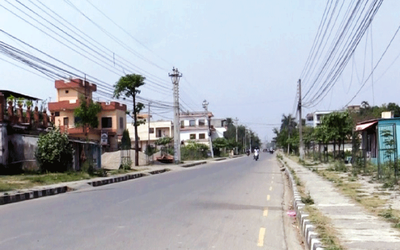The ever flamboyant and jocularly 'charming' Laloo Prasad Yadav was pictured sad, lost and even shocked in the newspapers on the 25th of November. Hogging the front page headlines and stories was another man quiet opposite to Laloo's character. Despite people cheering and dancing around him he seemed quite calm, composed and had a gentle smile on his face: The man was Nitish Kumar.
The JD (U)-BJP alliance that Nitish led had won a thumping majority in the state assembly elections - . an unbelievable 85 percent of the 243 seats at stake. The JD (U) stalwart thundered: "This is not a victory of my party. This is a victory of development and a victory of Bihar."
Indeed, the chief minister-reelect had turned out to be a Messiah of sort for Bihar. The state's face was completely overturned during his first innings. Right from empowering the women by distributing around 400,000 bicycles all over the state, putting more than 50,000 criminals behind bars to improving the law and order situation, constructing thousands of kilometres of road where there was previously only some hundred kms, Nitish was able to do something which was never thought of in Bihar, often termed as an 'ungovernable' state. The state registered an 11 percent growth rate under him
The question now being asked is: Has a new and a sensible kind of politics finally emerged in India? Does identity politics, which plays a huge role in Indian politics, no longer matter?
The new CM claimed that religion and caste based politics was no longer influential and that the people voted for only those who brought development and worked for the state and the people.
It will however be too early to agree with him. For several reasons. He has not discarded the caste factor altogether yet. The engineer-turned-politician very wittily engineered identity politics or the caste based politics along with his developments. To reach out to the dalits, he created another category even amongst them, called the 'Mahadalits' and another category called the Extreme Backward classes from the already existing Other Backward Classes (OBCs) category. He provided them with special financial packages. While addressing them, he cleverly said "Don't think I am creating these categories to play caste politics. I have created these categories so that you people get what you deserve from the state".
Moreover, Nitish was also reluctant in letting the controversial BJP leader and Gujarat CM Narendra Modi campaign in Bihar, for the fear of losing the Muslim votes. Modi has been accused of having a hand in the 2002 religious riots of Gujarat. What's more, Nitish who has been credited with ushering in a new kind of clean politics in Bihar has not been able to disassociate the long-running criminal-politician nexus in the state. As a matter of fact, he even campaigned for a candidate from his party, who is in jail on murder charges.
It is clear that the development, the plank on which Nitish has boasted of wining the elections, was not the only factor. Had he been confident of a landslide electoral victory purely on the development plank alone, he would not have needed to target the dalits nor fear losing votes in case Modi campaigned. That he has not been able to completely dissociate from the criminal elements also show that Bihar politics is not yet free from crime and criminals.
It would be premature to conclude that he has ushered in a new kind of politics. In fact, politics would take even more time to change in a state like Bihar, where caste system and crime are deep rooted. You simply cannot wish them away just because a chief minister has done something positively different from his predecessors. Whether Nitish will be able to maintain the momentum in his second innings and repeat the electoral feat will have to be seen before giving him full marks for turning the Bihari, and indeed the Indian, politics around.
For now, the Indians can rejoice that the change has finally begun. As they say, well begun is half done? But the fact remains that the job is not complete yet. And the latter part of the journey is often tough, testing and tiring. Many, in the past, have flattered to deceive. Nitish will have to prove he is different.
As for the neighbouring Nepal which shares a long border with Bihar it should be happy if Nitish goes on to prove that he is made of a different mettle and change the face of one of the most impoverished and lawless states of India for the better. Nepal can look to Nitish for ideas and inspiration to change the face of one of the world’s poorest and bad-governed countries, that Nepal is. After all, Bihar will also stand to gain from Nepal’s progress and prosperity.
- TANAHU HYDROPOWER PROEJCT: A Significant Achievement
- Apr 15, 2024
- AMBASSADOR HANAN GODAR: Sharing Pain With A Nepali Family
- Mar 30, 2024
- VISIT OF KfW AND EIB TO NEPAL : Mission Matters
- Mar 25, 2024
- NEPAL BRITAIN SOCIETY: Pratima Pande's Leadership
- Mar 24, 2024
- NEPAL ARMY DAY: Time To Recall Glory
- Mar 15, 2024
















